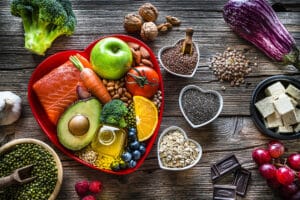A few years ago I had a student who complained that she was being driven crazy with hot flashes and did not want to go on hormone therapy. She decided to come see me professionally. I spoke with her and quizzed her about her diet. She had been following our health program exactly. I figured that she just needed an infusion of plant based hormones.
I explained to her that plant hormones are large, weak structures that fill up the hormone receptor sites in the body and keep them satisfied as needed without ever reaching toxic strength. When the body releases hormones erratically (as happens during many times of life but especially during menopause) those hormones can be absent or can be at toxic levels. With plant hormones filling up the receptor sites all the time, you never even know that the levels are up or down and potential toxic levels (which some say cause estrogen-dependent cancer) are never reached.
The best part of all this, I told her, is that your body will stop working so hard at meeting hormonal needs and will get to rest and re-set itself to a new level of health.
I explained that if we all ate natural diets all the time, we could not avoid huge amounts of plant hormones every day, and that our bodies really are designed to get most of their hormone needs from the diet.
She, of course, wanted to know what to do.
I told her about fava beans. These are the most estrogen dense food known. When sprouted, they become far more so, 3-30 times more.
I had her sprout dry fava beans (which took one afternoon in a bowl of water) and then low-heat them. Low heating is a technique described in two book: Traci’s Transformational Kitchen Cookbook and Traci’s Transformational Health Principles, which allows the bean to stay alive (in fact it will grow during the process and in the fridge thereafter) while softening the hard exterior.
My patient was then to blend them with a little extra virgin olive oil and seasonings to make a smooth savory “soup”. She was to eat at least 1/4 cup every day.
She actually ended up blending them with tomatoes and onions. She had it for dinner and then that night she got sick. I have never seen this before or since. She stayed sick for that night and was a little queasy the next day. After that she stopped having hot flashes.
Often today I read articles that are leading the readers to believe that soy is the premier source of phyto-estrogens. Not so at all. Further, many people are reacting to soy as a food reaction and their health gets damaged by it. Besides this, soy protein (which is what many people are using) is a by-product of making soybean oil and is very chemical laden.
Fava beans are the best source. They are usually experienced as tasty and are easy to digest. When sprouted, they become the best phyto-estrogen supplement known.
I have given fava beans to many people having hormone problems and I find them reliable relief. As with all sources of phyto-estrogens, fava beans are also somewhat anti-inflammatory.
Herbally (after all, this is an herbal medicine column), we use blessed thistle, black cohosh, kudzu root, wild yam, sarsaparilla, wheatgrass, red clover blossoms, alfalfa, vitex, dong quai and many others for herbal hormone foods. Most of these contain phyto-estrogens. Wild yam and sarsaparilla contain steroidal saponins which are hormone building blocks.
I no longer reach first for the herbal aids, however, but recommend sprouted, low-heated fava bean soup.



